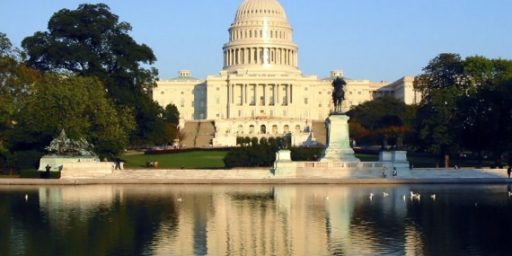Universities Financed Increasingly Through Subsidies
Princeton economist Alan Krueger compares academic earmarks to farm subsidies and military contracting:
The Farm-Subsidy Model of Financing Academia (NYT | RSS)
THE University of Michigan received $4 million for curriculum development and training at its Gerald R. Ford School of Public Policy. Marshall University in West Virginia received $11 million for a new heart institute. The University of Iowa is hoping to get $16.5 million from a pending highway bill to study taxation of drivers based on miles driven on certain types of highways.
These are just three of thousands of examples of recent “academic earmarks,” provisions inserted into federal spending bills to finance specific university projects, like research, or the construction of classrooms and laboratories.
[…]
Analyzing differences in lobbying expenditures stemming from differences in overhead rates with a statistical technique called “instrumental variables,” Professors de Figueiredo and Silverman found that a $1 increase in lobbying expenditures is associated with a $1.56 increase in earmarks for universities in districts that do not have a senator or congressman on the crucial Appropriations Committees, and more than a $4.50 gain in earmarks for universities with a representative on one of the Appropriations Committees.
Even among universities that do not lobby, those that have a congressman or senator on the Appropriations Committees tend to be awarded more earmarked funds.
In response, Krueger describes two solutions. First, universities could collectively “shun the practice” — something that the Association of American Universities is apparently pondering. Second, Congress could decide to use only the competitive grant process.
The reduction in academic earmarks would improve economic efficiency, but it’s a much harder political task than Krueger makes it out to be. There’s a reason that even politically inactive universities receive benefits from sympathetic legislators: nobody wants to say no to education. Actually, nobody dares to say no to education, lest he or she gets branded as a heartless thug. Just look at the polls. Put differently, if you want to bring pork to your district, and you know that an uphill legislative battle awaits, you can increase your chances for success by wrapping the cloak of education around your bill. These considerations represent the overriding issue at hand.






While the left screams about the ever increasing budget deficit, they, at the same time reap the benefits of political pork directed at the left wing loonies we see teaching at our universities. Lets face it, our nations schools and universities are turning out a bunch of rum dumbs that subscribe to increasingly left wing socialist thinking. What a complete waste of taxpayer dollars!
Herb, relax. Have a beer and a sense of proportion. Important to note on budget issues is that the concepts “million” and “billion” are different, and that the first is significantly smaller. Something stinks about this, but the taxes from it aren’t sending you to the poorhouse.
1) How does Princeton’s per capita endowment
compare
with universities that receive earmarks? Is it
larger or smaller?
2) How much money does Princeton receive
in earmarks? More or less than average
after adjusted for per capita
endowment?
3) “a
university’s academic standing, as measured by the National Academy of Science’s
ranking of departments, is not related to the amount of earmarked funds it
receives””